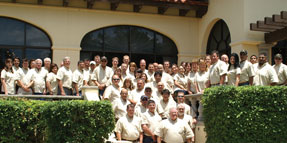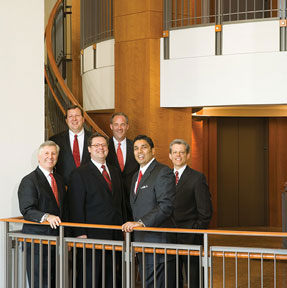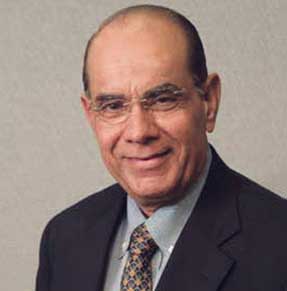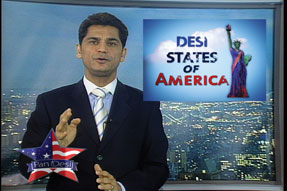Business
In Good Company?
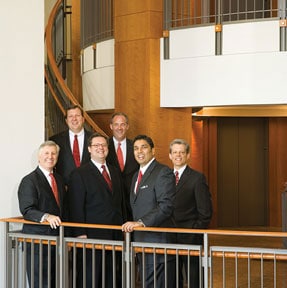
Indian American companies are scrambling to cope with the deepest recession in a half century.
| The global financial tsunami continues to wreak havoc on individuals and businesses in the United States. Nearly 1.1 million Americans filed for bankruptcy in 2008, a 32% increase over the year before. Business bankruptcies grew 54% to 64,318, according to Automated Access to Court Electronic Records (AACER).
Sunil Kewalramani, CEO of Global Capital Advisors, projects that 62,000 small, medium and large U.S. companies will fold this year. Indeed, AACER reports that bankruptcies surged 37% in February from the year before; business bankruptcy filings grew 47% to 6,603 during the month.
Public attention has focused largely on the 136 public companies that went bankrupt in 2008 — a 74 percent increase from 2007 — such as Lehman Brothers, Washington Mutual, Circuit City, Ritz Cameras, and CompUSA. But tens of thousands of medium and small sized businesses have been swept into the economic tsunami’s vortex as well. Indian American companies, which have been ascendant over the past two decades, are not immune from these global financial forces. Several Indian led public companies have taken a severe hit during this recession, most notably Citi Group, led by Vikram Pandit, whose share value at $2.85 is trading at almost a tenth its price from a year ago. Likewise, Hartford Financial Services Group, led by Ramani Ayer, is trading at $9.28, down 80% from a year ago. Both companies have between them laid off thousands of employees. Ethan Allen, the home furnishings store led by Farooq Kathwari, is trading at $11, down two-thirds of its value from last year and has announced several rounds of layoffs.
Among the few Indian led public companies to buck the recession is Rohm & Haas, a specialty technologies manufacturer led by Rajiv Gupta, whose share price at $78.63 is running just a tad ahead from a year ago, thanks to its acquisition by Dow Chemicals. But the company is shedding over 3,000 jobs as a result of the acquisition, for which Dow has been widely panned and Dow’s own share price has fallen to below $9 from over $43 a year ago. Audio giant Bose Corp., which is led by Amar Bose, announced in February that it was laying off 1,000 employees, roughly a tenth of its workforce, citing the global recession and a decline in consumer demand for electronics. In a statement, the company said: “We have been staffed for a growing economy, not a global recession. As a global company, we are responding to these challenges.” In December, federal regulators seized and closed Haven Trust Bank, in Duluth, Ga. The bank, which had $515 million in deposits, was led by two brothers Mike and R.C. Patel, who own four hotels under the Diplomat Co. brand. The Federal Deposit and Insurance Corporation (FDIC), which insures U.S. banks took a $200 million hit from the bank’s closure, which has since been acquired by BB&T. Virtually every business is feeling the heat, perhaps none more so than those tied to the construction industry. Galaxy Builders, which provides general contracting services for real estate projects, find itself in the thicket of these tough times. Arun Verma, president of the Texas firm, says that since there is no equity in the markets, credit flow is constricted and no one is lending. The firm acquired three new government clients to preserve its profit margins and is seeking new business by bidding for federal, state, municipal, city and county projects. Its business volume declined 10%, from $118 million in 2007 to $106 million in 2008, and Verma projects that it will shrink further by 25% in 2009.
“Of the 12 projects we have in hand, three have been stalled, and we are bracing ourselves for inflation and another mild recession led by financials, due to which business will remain in the doldrums for the next 3-4 years.” Verma says the government’s aggressive mortgage modification program and housing turnaround plans will not come into effect until the third quarter and so will have limited impact. “I am doing my best to protect my employees, but in my business I can only cutback on employee costs and I may have to let go 10% of my current 65 employees over the next couple of months.” The saving grace, Verma says, is that unlike many of his competitors, his company has not lost any existing client and by shifting to government clients it has avoided being bought out by a larger player. Technology has long been the stronghold of Indian companies especially in the US. But this industry is feeling the weight of the recession as well. Major Indian outsourcing companies, such as Infosys, have announced belt-tightening measures. Radiant’s Venu Myneni, chairman and managing director of Radiant Systems, a $40 million IT products and services company headquartered in Piscataway, N.J., says the company has deployed various strategies to preserve profitability. Reducing its 500-strong workforce was not contemplated, but the company has implemented salary cuts, spending limits and a hold on expansion plans.
The 13-year-old company is charting plans based on the assumption that the economy will start recovering only in 2010 and that the overall outlook for the technology industry remains pessimistic. Says Myneni: “The industry in general is suffering from negative growth rate, rate reductions, lower profits, aged accounts receivables, major cash flow issues and clients’ bankruptcies. We are seeing many companies going out of business everyday because of loss of accounts. Some of them are suffering because of abrupt credit line closures by the banks.” Communication with all constituencies is key in this economy, says Myneni: “It is quite natural for any bank or investor to get alarmed with the current situation. Hence we are in constant touch with our banks and possible investors. I think, more than the tough business situation, the financial world gets concerned with lack of clarity and break in communication. The key is to keep them up to date with all the latest information, including numbers, marketing efforts, new initiatives, cost cutting plans, order pipeline and timely reports.” The financial crisis also buffeted the Tishcon Corporation, a $36 million healthcare company that provides oral drug delivery systems, such as capsules, chewable tablets and soft gel, which experienced revenue declines of 15% in 2008. CEO Raj K. Chopra says, “We have had to cut back on areas like travel, advertising, trade shows, which are important for business, but do not compromise quality and customer service.” So far, the cost cutting measures have allowed the New York based company to avoid laying off any of its 300 employees.
The picture is especially grim in the hospitality industry, which shed 3% in revenues in 2008, with 10% of the loss occurring in the fourth quarter. It is no surprise, therefore, that Indian-led hospitality private equity fund managers like Atlanta based Noble Investment lost 6% top line growth in the fourth quarter of 2008 to $160 million and had to reduce the number of project managers in half from 20 to 10. Mitesh Shah, chief executive officer of the 4000-employee company, said: “As our investment strategy began to change last year, we did not renew our development project managers as they completed new development and renovation projects. In our hotels in 2008 we ensured that our stringent fixed/variable labor model eliminated redundant positions, which resulted in a reduction of a few lower management positions.” The $700 million company, which owns 42 hotels in 15 states, also made major operational changes: “Two-third of our current $310 million private equity fund is available for investment. We have adjusted our approach to investment from one-third new development and two-third acquisition of lodging to now 100% acquisition of lodging assets and also investments in lodging debt. The shutdown of the capital markets means that our investment model projects us having to look at unleveraged yields for at least the next 24-36 months.” Lodging revenues typically decline ahead of other sectors and take even longer to recover. Shah says, “We have an operating model that is based upon a 25% reduction in year over year revenues, so we have built in a strong amount of cushion. At the same time we have a significant amount of capital to grow the business during these times as out of crisis comes opportunity.” Who does he think will survive in the hospitality industry? “The ones with an organizational platform and a strong culture and DNA in their people will survive. The ones with that and capital to invest will thrive.”
Vimal Verma, chairman and chief executive officer of Pan Desi, an English-language television network launched a year ago on Colours TV, says, “It will be a major achievement for organizations that continue to be in business by the end of this year.” Verma says that “tracking the ads being run by broadcasters, print and other media like radio and web, it’s obvious that the money has dried up even for those who were doing fairly well till recently.” His network, which is targeted at South Asian Americans, among the most affluent ethnic groups in the United States, posted an increase in revenues of 7% during the last two quarters of 2008, but Verma expects 2009 to be challenging. It is a sentiment widely shared by Indian American business leaders. Little India contacted the chief executives of 30 leading South Asian run companies to explore how they were coping with the recession, but most, such as Mohan Bhoola, chairman of the $30 million Florida-based hotel management company Elite Hospitality, and Ramesh Bhatia, CEO of the $200 million ATCO Rubber Products based out of Texas, declined comment. Mahendra Nath, president of the $110 million Minnesota-based Real Estate firm, Nath Companies, pointedly said, “I will not give this information to anyone to publish!” Among the few to go on the record, was Rahul Shukla, president and chief executive officer of S.S. White Technologies, one of the oldest manufacturing companies in America. The company saw sales tank 40% when its 1,200 clients, including Boeing and GM, slashed costs. The $28 million firm had two rounds of layoffs in which it let go of 61 of its 206 employees, almost a third of its workforce. However, even while showing the door to employees, the company management exercised an ethos of camaraderie, harking to its CEO’s Indian roots. “Lay-offs were unheard of at S.S. White and every decision to layoff was carefully considered,” said Shukla, who said he lost sleep over the wrenching decision. “At first our management team spent many days figuring out all the spending cuts we could imagine. We pushed out inventory purchases, cancelled or scaled-down some employee events, cut lots of discretionary spending, including travel, and finally came to terms with the fact that the $10 million payroll accounted for the majority of our costs.
“We had a Town Hall Meeting in which the whole plant got together and I explained that layoffs were very likely. We tried to be considerate that people would be sick with worry and wanted to get it over with quickly. As soon as we finished notifying the affected employees, we had another meeting with the rest of the group to let them know that the worst was over and that we had lowered our breakeven enough to keep us financially solvent. There was applause at the meeting. Although it had been a terrible day, our employees were relieved to know that we had taken care of things to make sure that the company would survive.” Shukla says that his mentor Bill Bogan, S.S. White’s former general manager, once told him, “If you lay someone off for financial reasons, then you should be able to look that person in the eyes and explain.” Therefore, Shukla made it a point to “preserve the dignity” of laid off employees, personally shaking the hands, hugging and apologizing to every terminated employee. Shukla says the company remains in regular communication with the laid off workers, helping them with resumes, job searches and references. “I feel so bad because these people are like family to me. We used to have social events every month including bowling nights, Take-Your-Child-to-Work day and ballgames with employee families at the Somerset Patriots Stadium. We had 40 employees from India so I made it a point that tasty vegetarian food like naan and samosa was served at every event. I ensured that these workers were part of the American culture, so for them working with us was like being part of America. Now I see them joining other companies and after work they go back home, shut out from American life.” S.S. White still continues to find new applications in aerospace and automotive industries and introduced a host of new products at an orthopedic show in Las Vegas. Shukla expects the decline to bottom out in April and an upturn in orders by September, when the company will be in a position “to hire many of these good people back.”
For all the economic carnage, a handful of Indian firms are bucking the recession. Glovista Investments, a small US-based financial investment startup is a case in point. The company was co-founded in late 2007 by Darshan Bhatt, at the start of the recession. As Lehman’s and Merrill Lynch collapsed, Glovista attracted clients by highlighting its independence from larger banks. Bhatt expects to lead his firm through the bumpy financial ride, “As long as we cutback discretionary spending and postpone all major expenses, the company will be in the black in 2009 and grow assets by at least 50-60%.” Saturn Wireless, a New Jersey based wireless solutions company founded by Manika Sood, has also escaped the wrath of the recession. The company is AT&T’s largest mobile partner nationwide and the leading provider of wireless applications. Many of Saturn Wireless’s larger customers reduced orders, but the company maintained $10 million in sales in 2008. “The growth drivers especially in the last few months came by way of offering indispensable products that are a need, and not just a want, and showing how wireless spend actually increases the return on investment,” says Sood. The company continues to hire and Sood is leveraging the downturn by expanding her sales force and product offerings across the country. “Our clients may be inspecting every dollar spent, but we are standing stronger than ever before,” Sood says optimistically, “and are ready for the growth that the healthier market will bring.”
Healthcare remains one of the few bright spots in the U.S. economy and Schering-Plough, a publicly listed pharmaceutical firm, has risen that tide, posting a healthy 46% increase in net sales to $12.7 billion and a 36% increase in profits to $3.5 billion in 2008. The company recently merged with Merck, among the few M&A (mergers and acquisitions) during the economic downturn. Fred Hassan, chief executive officer of the company, said in a statement: “At a time when many others in the industry are facing pipeline droughts and patent cliffs, we believe we’re in the sweet spot on product flow and expected exclusivity. This gives us a special edge.” Galaxy Builders’ Verma exudes confidence about overcoming the economic downturn on the entrepreneurial strength of the community: “Indian-run companies are generally headed by first generation immigrants who tend to be hard-working and run lean and efficient organizations, which will survive this downturn.”
|

